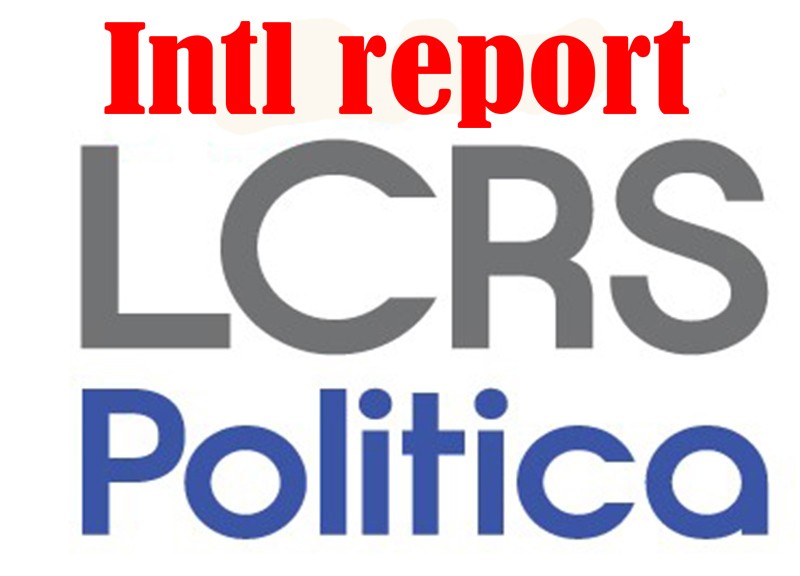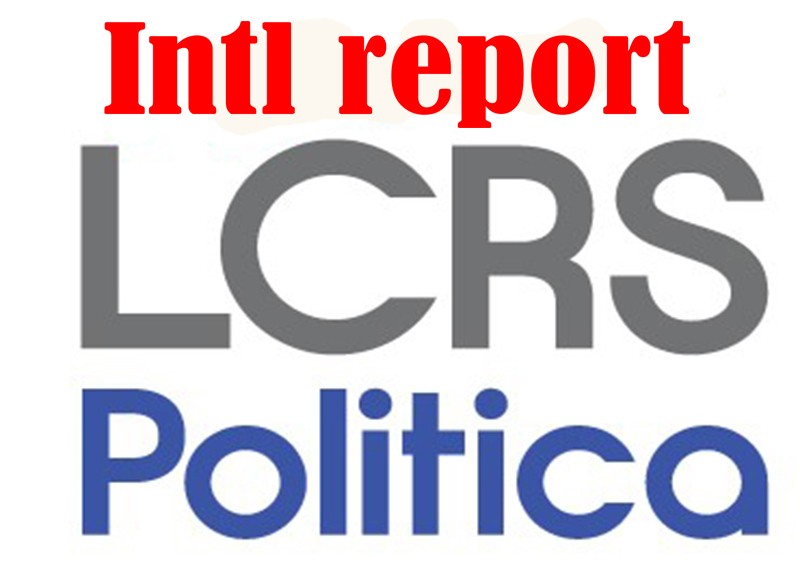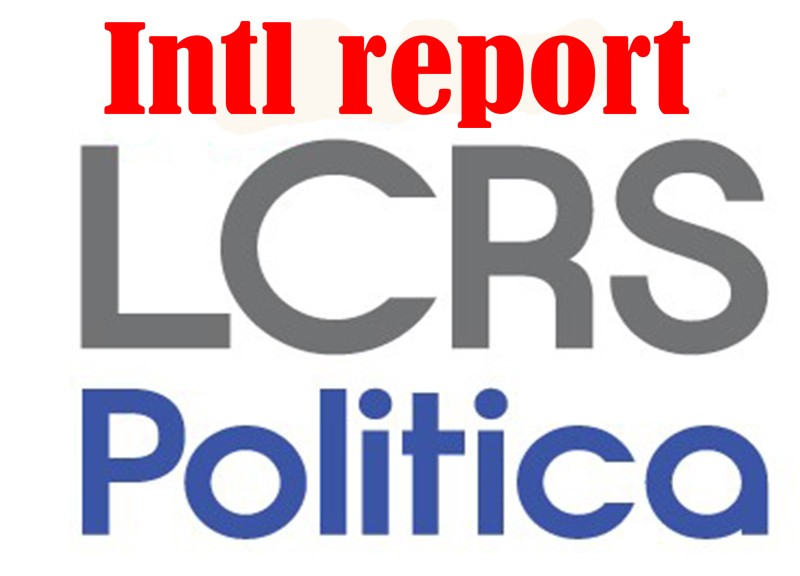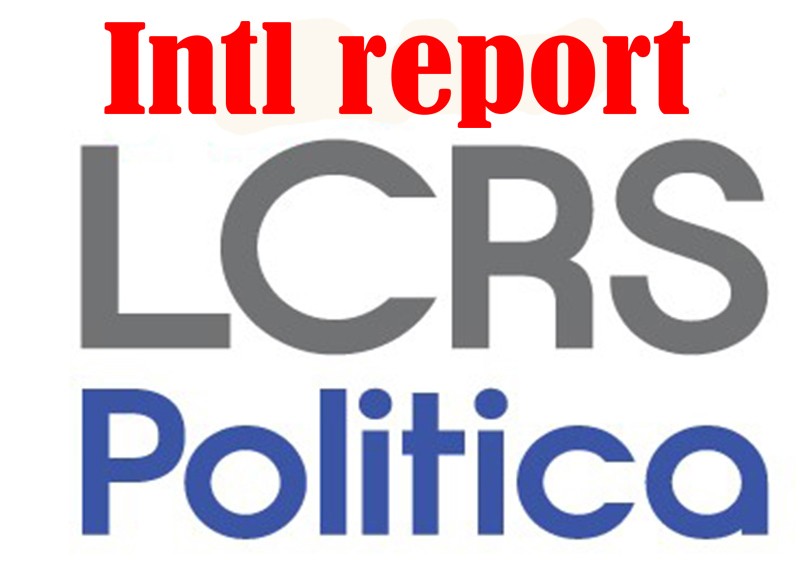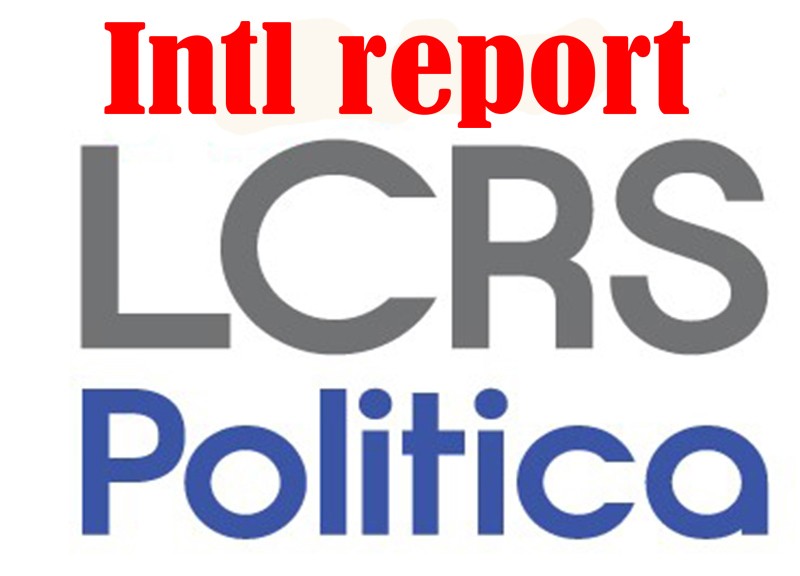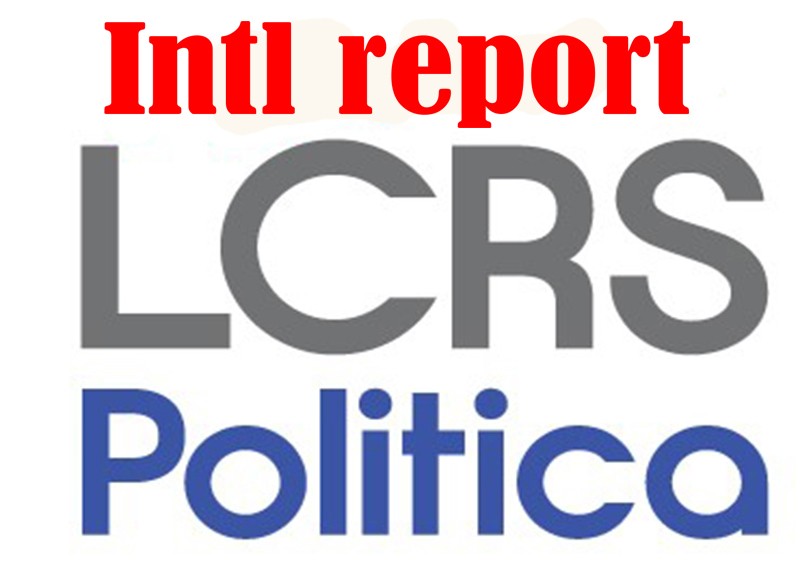
International Report 11 – June 7-17, 2020
The LCRS Political Team provides an analytical reading of the events in Lebanon, the region and the world.
- Introduction
On Lebanese affairs
After the patriarch Al-Raa’i, reiterated his position for the second time in his sermon on Sunday, regarding the issue of lifting the siege on legitimacy and the free national decision and adhering to the neutrality of Lebanon, the patriarchal edifice in Bkerke at the beginning of the week was filled with visits of Lebanese and Arab political figures and delegations. At the end of the week, the patriarch moved to Al-Diman, his summer residence, and people followed him to support his steadfast in his national position.
The report follows this new political movement and stresses that Patriarch Al-Raa’i's position and his adherence to these principles are today the only way out for Lebanon from its growing political and economic crisis.
The report estimates that with interlacing the sovereign forces and their support for the Patriarch in this position, it is possible to open a skylight in the wall of the crisis to try to reverse the equation imposed on Lebanon, the state and institutions.
- The report
The report team provides an analytical reading that will put in light the main events around the world.
- On Lebanese issues
Under the title: "Shortages, inflation and blackouts: the Lebanese economy is on the edge of a precipice." The French newspaper Le Figaro wrote on page 10 of the international section in its issue on Saturday-Sunday, a full page that depicts the tragic situation in which Lebanon has reached.
Pénuries, inflation, pannes d'électricité: l'économie du liban au bord du gouffre.
The article can be read through the following link:
On an other hand, with the beginning of the week and in response to Erdogan's decision to convert the Hagia Sophia Museum into a mosque, the former Prime Minister Fouad Siniora issued a statement in which he asked the Turkish leadership prudence and to review the decision to convert the Hagia Sophia to a mosque, he also considered that this decision is harmful to Muslims and to the form of moderate and open Islam. Also, the follow-up committee of the First Arab Christians Conference - Paris issued a call in which they expressed their commitment to building a path of human rapprochement and reviving concepts of openness in the region, and called on Turkey to review the political dynamics that it is working on in general and to review the decision related to the Hagia Sophia Museum In particular, by virtue of the effect of these pathways on the whole of the countries of the region. The call was issued with the signatures of a number of opinion leaders, media figures and specialists from a number of Arab countries including Lebanon.
In another context, it was remarkable that the US Secretary of State, Mike Pompeo, indicated that the bet of Hezbollah and its allies in the Lebanese government on the results of the upcoming American elections is far from reality. Washington's position regarding providing assistance to Lebanon will not change even if the American administration changes. In response to a question for Al-Hurra channel at his press conference on Wednesday, Pompeo said that "the Lebanese people have a set of demands which are simple and very straightforward. They do not want corruption, they want a government that meets the people's demands and a government that is not subject to the influence of a terrorist classified organization, which is Hezbollah." "The people want what all the people around the world want, so they are on the street demonstrating and demanding that," he added. “The Lebanese want an ordinary economic activity, they want to collect taxes fairly, this is what the Lebanese people are demanding, and they must continue to demand that. ”
Pompeo stressed that when the Lebanese government shows that it is doing this work well and correctly, "I am confident that countries from around the world and the International Monetary Fund will be ready to provide the financial support that the government wants to implement the reform plan that the Lebanese people deserve." He pointed out that this matter will happen if this administration exists or in the next administration, the position of the United States is very clear and supported by the Republican and Democratic parties.
In another context, the Maronite Patriarch Cardinal Al-Rahi said in an interview with "Vatican News" that "there is a kind of Hezbollah hegemony over the Lebanese government and politics because of interfering into Arab and international wars and alliances that Lebanon does not want, and this created a major political crisis that resulted a very severe economic and financial crisis, and neutralizing Lebanon is the solution, "stressing that" there is no salvation for Lebanon except through a system of active, positive and committed neutrality, and this brings us out of the hegemony of any Lebanese group and also takes us out of regional and international political or military conflicts. " He explained that "the positive neutrality is in that Lebanon is committed to defending the Palestinian cause and issues of peace and stability in the region without entering into any political or military alliance," saying that "Lebanon is left today from Arab countries, especially the Gulf states in addition to European countries and the United States and they are saying they cannot help Lebanon because of the hegemony of Hezbollah.” And Al-Rahi indicated, "We are not against Hezbollah, but rather we say that we want to live with each other equally and to build a sound society for Lebanon. There is no solution for that except by getting out of political and military events in the region." He pointed out that "we continue to explain the principle of neutrality with the Lebanese leaders and the Lebanese people in the first stage and afterwards with the ambassadors of foreign and Arab countries and then with the Holy See until the matter reaches the United Nations."
Political and economic events:
- Patriarch Al-Ra’i in Sunday’s sermon again calls on President Aoun to lift the siege on legitimacy and free national decision and adheres to Lebanon’s neutrality. He added: It seems that politicians want to hide their responsibility in emptying the state treasury, and don’t want to undertake any reform as requested by states, and that they agreed to the quotas approach.
- Statement of “Lady of the Mountain meeting”: declares its support for the Patriarch's positions and awaits with the Lebanese the decision of the Special Tribunal for Lebanon.
- FPM discussed major political options internally and externally, customs and export issues, statement of accounts and control of transfers.
- The Future Bloc affirmed its respect for what will be issued by the International Court: to neutralize Lebanon and not to tamper with its constitution, its Arab identity, and its free economy
- Kataeb: Lebanon is united with its neutrally, sovereign with its decision strong by its constitution and prosperous to its sons.
- The National Initiative Movement: affirmed that the Maronite Patriarch’s request dropped the Christian berries paper from Hezbollah’s weapon and ended the Aounist coverage stage for this weapon. The movement warned that Lebanon today lives in conditions similar to the facts that occurred in 2006 and it is feared from similar results, that is, Lebanon would be lead to a similar war in service to Iran's influence and its nuclear file.
- Establishing a bank restructuring committee and a memorandum from Riad Salemeh that defined its functions.
- Fulfillment of Resistance (Hezbollah block): Addressing the crisis requires a coherent national position and the rescue tasks require the government to have a more productive effectiveness.
- In front of the increase in number of people infected with COVID-19 during the past few days, the Medical Syndicate in Lebanon issued recommendations to reduce Corona: to strictly implement preventive measures.
- On Syrian Issues
Finally, the UN Security Council was able to adopt a German-Belgian draft resolution that renews the provision of humanitarian aid to Syria through the cross-border mechanism, after the draft resolution won the support of 12 countries, and Russia, China and the Dominican Republic abstained from voting, which allowed it to be adopted, as it needs nine votes, if none of the permanent members use the "veto". The draft Resolution No. 2533 is to provide cross-border humanitarian aid through one crossing, the Bab Al Hawa crossing, for a year. The resolution also requests the UN Secretary-General to submit his report at least every sixty days to the Security Council on its implementation.
This is the fifth resolution that the council votes in five days on the subject after it failed to adopt four previous resolutions, two submitted by Belgium and Germany, and they won the support of all member states except Russia and China, who used the "veto" against it. As for the two Russian projects, neither of them received the minimum of nine votes required to adopt the project. The mechanism for introducing cross-border humanitarian aid to Syria was completed at midnight Friday, New York time, at 7 am Syrian time.
After the vote and on behalf of his country and on behalf of Germany, the Belgian Ambassador to the Security Council, Marc Pecsteen de Buytswerve, said that they are the two countries that drafted the project and carry the Syrian humanitarian file in the Security Council: ”There are 11 million Syrians in need of basic humanitarian aid, including food, shelter, medicine, water, etc.. Since 2104, the cross-border mechanism has helped to provide humanitarian assistance that saved the lives of millions.” Explaining that the closure of the Bab Al-Salam crossing will mean that part of the aid will not reach the required amount to those in need. Then he added, “There are a million people in the Aleppo region, including 800,000 internally displaced people and half a million children, who were receiving humanitarian aid through the Bab Al-Salam crossing that was working until yesterday, it is a sad day for this council and the Syrians.The Al-Yarubiya (Iraqi) and Bab Al-Salam (Turkish) crossings were vital crossings for the delivery of humanitarian aid to the northeast and northwestern Syria. Humanitarian aid is reaching Bab Al Hawa for nearly three million Syrians in the northwest. This is the reason why we had to accept this, in order not to deny them also access to aid.”
After the vote, the German ambassador and the ambassadors of the Russia and China exchanged accusations. The Russian side said that it was ready to vote on a draft similar to what was voted on last Monday, but that Western countries wanted to submit drafts for a vote, even though they knew it would not be adopted. He accused them of doing so just to pretend. As for the Chinese side, they wondered why the Western countries rejected the Chinese and Russian request that the Secretary General submits a report on the impact of Western sanctions on the Syrian regime’s ability to combat Corona. For its part, Western countries accused Russia and China of supporting the Syrian regime at the expense of millions of Syrians who need help.
And the tide continued behind the scenes in the Security Council between Western countries on one hand and both China and Russia on the other, until the final hours of the vote on Saturday evening, New York time. The most important differences between the Western countries and the Russian and Chinese sides on two issues can be summarized: the time period of the decision, and the number of crossings through which humanitarian aid can be provided. Western countries wanted to continue providing humanitarian aid from the two Turkish crossings, namely Bab al-Salam and Bab al-Hawa, while Russia and China refused and insisted that this be done only through Bab al-Hawa, provided that the rest of the aid be provided through the areas controlled by the Syrian regime. As for the second matter, it revolves around the period of time, which is one year versus six months. Western countries were able to pass the extension point for a year instead of six months, but only from one crossing.
It is reported that the Security Council agreed that the United Nations provide cross-border aid in 2014 under Resolution 2165 and through four crossings, namely Ramtha (Jordan), Al-Arabiya (Iraq), Bab Al-Salam and Bab Al-Hawa (Turkey). This was until the tenth of January. Last December, Russia and China used a veto and thwarted the Security Council’s adoption of a draft resolution renewing the mechanism of providing cross-border aid in Syria through three crossings, instead of the four that were in place, namely the Turkish crossings and the Iraqi crossing. The decision had won the support of 13 of the 15 countries. Then, the Security Council adopted Resolution 2504 (2020) on January 10, which allows the provision of cross-border humanitarian aid through Turkish crossings only and for six months that ended Friday.
- On Libyan issues
The US military in Africa (Africom) said on Wednesday that it has clear evidence that the Russian Wagner group, supported by the Kremlin, planted landmines and explosive devices in and around the Libyan capital, Tripoli. She added that this violates the United Nations arms embargo and endangers the lives of innocent Libyans. The US military command said, in a statement on its website, that confirmed photographic evidence shows explosive traps and minefields randomly placed around the outskirts of Tripoli leading to Sirte since mid-June. She explained that the evaluation confirms that these weapons were introduced into Libya by the Wagner Group. General Bradford Gering, the director of operations for Africom, said the Russian-sponsored Wagner Group "shows a total disregard for the safety and security of Libyans." Noting that, "the irresponsible tactics pursued by the Wagner Group, prolong the conflict and are responsible for unnecessary suffering, and lead to deaths among innocent civilians. Russia has the power to stop it, not just the will." In late May, AFRICOM revealed the transfer of at least 14 MiG-29 aircraft from Russia to Syria, where Russian signals were obscured to conceal their identity, and then they were transferred to Libya, in violation of the United Nations arms embargo. Africom emphasized that Russia's smuggling of landmines, booby traps and attack aircraft, and its continued support for the Wagner Group, which has 2,000 people in Libya, is changing the nature of the current conflict and increasing the potential risks to non-combatants. Africom statement also stressed that Russia's use of private military companies in Libya is just part of a long history of using these agencies as tools, as Moscow-backed military companies are active in 16 countries across Africa.
As tension between the two rival governments and its supporters in Libya continued, the reconciliation government released an image that showed "military supplies coming from Egypt", after the parliament of the east of the country announced that it would allow Cairo to interfere if the security of either country was threatened. The media center of the Libyan reconciliation government forces published on its official Facebook page a picture that it said "was taken, Tuesday, in Tobruk, showing military supplies coming from Egypt." On Monday, the Libyan parliament in Tobruk issued a statement regarding allowing Egypt military intervention in Libya when necessary. The statement described the Turkish role as interference "in violation of the sovereignty of Libya, with the blessing of the armed militias controlling the west of the country and the de facto authority they are subject to." "The Egyptian armed forces intervene to protect the Libyan and Egyptian national security, if they see that there is an imminent threat to the security of our two countries," the statement said. The statement called for concerted efforts "between the two brothers, Libya and Egypt, to ensure the defeat of the invading occupier, preserve our common national security, and achieve security and stability in our country and the region."
- On Palestinian-Israeli issue
Hundreds of people gathered in the streets of Jerusalem to call on Prime Minister Benjamin Netanyahu to resign, as Israel witnesses new record cases of the Coronavirus, amid the economy severely affected by the crisis. Where the city of Tel Aviv witnessed protests in which thousands of Israelis, that lost their jobs or were economically affected as a result of the embargo and closures after the outbreak of the Coruna virus.
On the other hand, Iran has witnessed over the past few weeks a series of unusual bombings that hit vital facilities such as a nuclear enrichment complex and factories and gas pipelines, which prompted a number of diplomats and analysts to speculate that there are Israeli or American hands or other parties behind the bombings. While reliable information is difficult to obtain from inside Iran, there is evidence that at least two incidents occurred inside sites linked to Iran's missile and nuclear program. The New York Times reported on behalf of a "Middle East intelligence official" that Israel planted a bomb at the Natanz nuclear facility in the building where Iran is working to develop advanced centrifuges, and the Times of Israel also said that this "official" may have been Mossad chief Yossi Cohen. However, the escalating conflict between Israel and Iran is equally incomprehensible, but a number of factors suggest the correctness of reports that Israel may have found the time to attack a facility like Natanz, and may even have been involved in a wider campaign of sabotage.
It is known that Israel has a history of targeting nuclear sites to prevent other regional forces from developing nuclear weapons, as it destroyed the Iraqi Ozirak reactor in 1981 and the Syrian nuclear facility in Al-Kibar in 2007, and helped the United States launch an electronic war on Iranian centrifuges in 2009, when the Stuxnet virus was spread. But even if the attacks were tactically successful, it is unclear that they have made strategic gains. In some cases it has increased the regional race for nuclear armament. One of the reasons that most likely implicate Israel in Iran's bombings is that Washington has not resisted potential covert actions against Iran. Indeed, the New York Times recently stated that the United States may coordinate such operations with Israel.
It has become clear that Israel, with its recent practices, is not only aiming to drain Iran's capabilities, but rather dragging it to commit reactions that would destroy the rest of the nuclear deal or the "joint comprehensive plan of action", after the American withdrawal in May 2018. And by provoking an Iranian response that shows the lack of Tehran’s government compliance and retreat from the commitment to the agreement before the Europeans. It is true that Tehran needs to maintain its trade relations with Europe, Russia and China to help preserve its sanctions-heavy economy. For this reason, it is keen not to cross the permissible lines and prevent slipping into a flagrant violation of the agreement. But if it turns out that the recent series of explosions near Tehran is actually the start of a more influential and provocative Israeli campaign, Iran will have to decide how to secure its nuclear program from future attacks, which could mean transferring its nuclear activities to military sites. This would risk violating the joint comprehensive plan of action by making it difficult for the International Atomic Energy Agency to reach Iranian nuclear sites.... Will Tel Aviv succeed in provoking the Iranians and achieve its goals in directing the last blow to the remaining nuclear agreement with Tehran?!
- About the COVID-19 virus in the world
Everyone is waiting for an effective vaccine that will rid the world of the nightmare of the new Corona virus, "Covid-19", which is still hitting the world with ferocity and multiplying its numbers every day. And the figures for the emerging corona virus «Covid-19» revealed, that the number of infections with the epidemic of the new corona virus «Covid-19» is approaching 14 million infections.
The World Health Organization warned on Monday that the world will not regain "what it was in a normal state in the foreseeable future", after the record-breaking number of new infections with the new Corona virus reached 230 thousand. "The virus remains the overt enemy of the number one, but what most governments and individuals are doing does not reflect this," Tedros Adhanom Gebresos, director general of the organization, told reporters, noting that "a large number of countries are going in the wrong direction." The World Health Organization, on Tuesday, warned that the spread of the Covid-19 epidemic is "accelerating" and acknowledged that "evidence is emerging" about the transmission of the Covid-19 infection in the atmosphere, after a group of 239 international scientists sounded the alarm about this type of transmission. The World Health Organization revealed that the number of people infected with the emerging coronaviruses virus (Covid-19) in the world as of this evening, Wednesday, July 14, 2020, has reached 13,659,754 cases, of which 7,974,121 cases have recovered. In terms of deaths, as of Wednesday evening, the number reached 585,590 deaths, and the United States of America also tops the list of countries with the highest deaths, followed by Brazil.
- On the internal and external American affairs
China on Wednesday threatened to impose sanctions on the United States in response to US President Donald Trump's approval of a law authorizing sanctions, especially banking, on Chinese officials against the background of the National Security Law that Beijing imposed on Hong Kong. The Chinese statement came hours after the US President announced that he had ordered the end of the preferential treatment enjoyed by Hong Kong in trade with the United States, and that he had signed a law passed by Congress and authorized the imposition of sanctions, especially banking, against the background of the National Security Law that China imposed on the city. Trump said during a press conference that Hong Kong will be treated from now on just as mainland China is treated, without special concessions, no special economic treatment, and no export of sensitive technology. The US president stressed that Hong Kong citizens "were deprived of their freedom and their rights were taken away", adding: "Thus, in my opinion, Hong Kong will have gone because it will not be able to compete with the free markets anymore, and many people will leave."
- On Iraqi issues
The Joint Operations Command in Iraq said on Wednesday that Prime Minister Mustafa al-Kazemi had assigned land and sea military forces to control the border crossings with Iran and Kuwait and those bordering the Gulf, in conjunction with a visit to Basra in the south of the country. The leadership said in a statement that "Basra Operations Forces will take full control of the Shalamcheh port with Iran and the Safwan port with Kuwait, while the command of the Marine Force has been assigned full control of the seaports in the northern, central and southern port of Umm Qasr." The statement added that the forces that will control the border crossings were empowered "with all powers to impose security and law enforcement and to deal directly with any violation of the law or the state of transgression, no matter who is behind it, and imposing state prestige and protecting public money." The statement pointed out that "the joint operations command continues to impose control of all border crossings with neighboring countries." During his visit to Basra, Al-Kazimi pledged to implement a campaign to regain control of all border crossings in the country. These measures coincided with the Iraqi cabinet meeting on Wednesday in its weekly meeting in Basra, where Al-Kazemi confirmed that the cabinet voted "not to allow any party, whether party or tribal, to bear arms." And Iraq, which depends more than 90 percent of its budget on oil, is going through the worst economic crisis in its history, as the second largest oil producer in OPEC failed to diversify the economy and find alternatives to black gold.
- On Yemeni affairs
The issue of the tanker "Saffer" is exacerbated, as the United Nations warned on Wednesday that if no action is taken to deal with the dilapidated oil tanker anchored for years off the coast of Yemen, it may leak from it four times more than what leaked from the tanker Exxon Valdez and caused an environmental catastrophe off Alaska in 1989. The tanker "Saffer" carries 1.1 million barrels of crude oil, and it has been parked off the seafront of Ras Isa, the sea, for more than five years. Saudi Arabia’s delegate to the United Nations, Abdullah Al-Muallami, said that the aforementioned oil tanker threatens to cause severe damage to the southern Red Sea and the entire world, calling on the Council to take strong measures to deal with the threat it poses.
On the other hand, US Secretary of State Mike Pompeo released Thursday a picture of Iranian arms shipments, which were intercepted by American and allied forces before they entered Yemen on June 28. Pompeo added in a tweet that the ship was carrying illegal Iranian shipments, including surface-to-air and surface-to-surface missiles, as well as anti-tank missiles, hundreds of "RPGs" and rifles, and many advanced weapons. He called for the extension of Resolution No. 2231, concerning the ban on the export of arms to Iran. Pompeo announced Wednesday in his press conference at the State Department headquarters that the United States and allied forces seized the ship carrying Iranian weapons to the Houthis in Yemen. He said: "The Security Council must extend the arms embargo on Iran to prevent further conflicts in the region ... No one seriously believes that Iran will use the weapons it obtains for peaceful purposes."
- On Egyptian affairs
The round of negotiations for the Renaissance Dam between Egypt, Ethiopia and Sudan, which lasted 11 days without an agreement, ended on Tuesday, at a sensitive time with the end of the deadline of two weeks. The Ethiopian Minister of Water and Irrigation announced that the tripartite talks that took place between Egypt, Sudan and Ethiopia over the Renaissance Dam were unsuccessful. Egypt says that the dam threatens the flow of the Nile waters, most of which originate from the Blue Nile where the dam was built, and its repercussions may be devastating to its economy, water and food resources. Egypt derives 97 percent of its water from the Nile. While Ethiopia has repeatedly said it wants to fill the dam reservoir this month, in the middle of the country's monsoon season, Egypt and Sudan are pushing for an agreement first on how to operate the giant dam.
On the other hand, the Libyan tribes announced their full support for the parliament and the national army, and their support for Egypt's call to intervene to protect national and Egyptian national security, which indicates the central role of these tribes in the coming days, and their ability to make a quantum leap in the Libyan crisis, and its formation as a "strong barrier" In the face of Turkish ambitions and its allies. A delegation from the Supreme Council of Sheikhs and notables of the Libyan tribes arrived in Cairo on Wednesday to announce the support of the tribes for the invitation, which was launched by the Libyan Parliament, to the Egyptian armed forces to intervene militarily to maintain Libyan national security.
On Thursday, Egyptian President Abdel Fattah Al-Sisi stressed that Egypt, if it interfered in Libya, it would change the military scene quickly and decisively, pointing out that Egypt would intervene directly in Libya to prevent it from becoming a hotbed of terrorism, stressing that it needed the approval of the Egyptian parliament to intervene in Libya. . He said in a speech during a conference of sheikhs and notables of Libya, on Thursday, that the Egyptian army is one of the strongest armies in the region and Africa, but it is rational, and Cairo always supports the political solution in Libya, pointing out that the parties of the conflict do not have the will to make political decision because of the interference of external forces that employ some parties to their interests, pointing out that the continued transfer of mercenaries from Syria to Libya threatens the security of the whole region.
Al-Sisi stressed that Egypt does not have any positions opposing the western region in Libya, but it will not stand idly by if it crosses the Sirte-Al-Jafra line, and will not accept destabilizing the eastern region in Libya.
- On Iranian affairs
A report by the International Atomic Energy Agency indicated that as of last June, Iran possessed more than 1500 kilograms of low-enriched uranium, in clear violation of the 2015 agreement that specifies for Iran to possess only 300 kilograms of uranium with a enrichment rate of only 3.67 percent, which is much lower than the levels required to produce nuclear weapons. And Iran now possesses 1500 kilograms of uranium, that it has enough to make a nuclear bomb, in the event that it decides to proceed to the production of a bomb, however, this stock remains much lower than it was in the days before the 2015 agreement, where Tehran had enough to make More than ten bombs and chose not to convert their stock into a weapon.
In this context, Iran has witnessed in the past two weeks a series of explosions and fires that shook several military and industrial installations and sites, including the main Natanz facility in its nuclear program and the Parchin facility, which is central to its missile program. Political analyst Khattar Abu Diab says in the London Arab newspaper: "Security mysterious actions in Iran have been pursued in Iran recently and are undoubtedly linked to an attempt to strike or delay the nuclear and missile programs. These events appear as a continuation of Washington's 'maximum pressure' strategy and of the assassination of General Qassem Soleimani. It is more likely that Israel would be behind it with American participation or after an American green light. " He adds: "It is unlikely that the Iranian response will be postponed, and the most likely possibility of this response would come from one of the Iranian arms in Syria, Lebanon or Iraq, which puts the entire region on a hot plate in the battle to determining the sizes and destinies." On the Israeli side, the failure to declare responsibility for the Iran bombings is considered an attempt to not to reach the open conflict with a preference for a hybrid war that combines electronic warfare, security actions and some limited targeting.
In the same context, Fahd Al-Khaitan sees in the Jordanian newspaper Al-Ghad that "with or without the support of the United States, it is clear that Israel has replaced the direct and costly military confrontation with Iran with an intelligence and cyber war in the Iranian depth to disrupt Tehran's nuclear capabilities." "The bombing indicates a shocking intelligence ability that allowed the crews of agents to reach one of the most heavily fortified sites in Iran and plant a bomb in its deep hollows. This coincided with a series of bewildering bombings of power stations and vital facilities, it is not yet clear if it was related to the Natanz bombing," he said.
- On European affairs.
German government spokesman Stefan Seibert said Monday that Berlin deplored Turkey's decision to strip the "museum description" of the Hagia Sophia in Istanbul. "The federal government, as confirmed by the country's foreign affairs during the weekend, regrettably received the Turkish decision that was taken on Friday," Seibert said in press statements, noting that "Hagia Sophia" has a great historical and cultural significance, and it has a religious value for every From Christianity and Islam. ”The spokesman added that there are currently waiting for the issuance of regulations governing how to use the site in the coming period.
The decision of the Turkish authorities to convert "Hagia Sophia" to a mosque has sparked criticism from several Western countries, including Greece, France and the United States, as well as the resentment of the Christian community, including the Russian Church, while UNESCO warned of the consequences of the decision to change the status of "Hagia Sophia" Without prior dialogue.
The European Council also condemned Turkey's decision to convert "Hagia Sophia" into a mosque, according to the Commissioner for Security and Foreign Policy of the European Union, Josep Borrell.
- On Turkish affairs.
The World Council of Churches, which represents 350 Christian churches, announced that it has sent a message to Turkish President Recep Tayyip Erdogan expressing "sadness and resentment" over his decision to convert the Hagia Sophia to a mosque. In the message, the Acting Secretary General of the Council of Churches, Yuan Sauca, stated that "Hagia Sophia was a place of openness, convergence and revelation for people of all nations and religions," noting that what Hagia Sophia formed was evidence of "Turkey's adherence to secularization" and "its desire to leave past conflicts". Behind it. " And he took on Erdogan that he "turned this positive reference to Turkey's openness to make it a sign of exclusion and division," saying that this decision threatens to encourage "the aspirations of other groups, outside Turkey, that seek to change the status quo and revive the divisions between religious societies."





